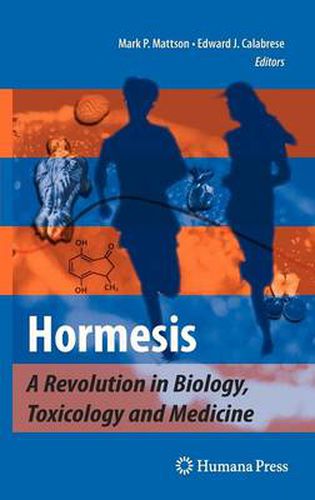Readings Newsletter
Become a Readings Member to make your shopping experience even easier.
Sign in or sign up for free!
You’re not far away from qualifying for FREE standard shipping within Australia
You’ve qualified for FREE standard shipping within Australia
The cart is loading…






The term hormesis is de?ned as a process in which exposure to a low dose of a chemical agent or environmental factor that is damaging at higher doses induces an adaptive bene?cial effect on the cell or organism (Calabrese et al., 2007; Mattson, 2008). To survive and reproduce in harsh competitive environments, organisms and their cellular components have, through evolution, developed molecular mec- nisms to respond adaptively to various hazards or stressors that they encounter. Examples of such stressors include chemicals ingested in food and water (metals, phytochemicals, etc.), increased energy expenditure (running, ?ghting, cognitive challenges, etc.), and reduced energy availability (food scarcity), among others. In most cases, the response of the cell or organism to the stressor exhibits a biphasic dose response, with bene?cial/adaptive responses at low doses (improved fu- tion, increased resistance to damage and disease) and adverse/destructive effects (dysfunction, molecular damage, or even death) at high doses. The prevalence of the biphasic (hormetic) dose response characteristic of biological systems merits consideration of hormesis as a fundamental principle of biology.
$9.00 standard shipping within Australia
FREE standard shipping within Australia for orders over $100.00
Express & International shipping calculated at checkout
The term hormesis is de?ned as a process in which exposure to a low dose of a chemical agent or environmental factor that is damaging at higher doses induces an adaptive bene?cial effect on the cell or organism (Calabrese et al., 2007; Mattson, 2008). To survive and reproduce in harsh competitive environments, organisms and their cellular components have, through evolution, developed molecular mec- nisms to respond adaptively to various hazards or stressors that they encounter. Examples of such stressors include chemicals ingested in food and water (metals, phytochemicals, etc.), increased energy expenditure (running, ?ghting, cognitive challenges, etc.), and reduced energy availability (food scarcity), among others. In most cases, the response of the cell or organism to the stressor exhibits a biphasic dose response, with bene?cial/adaptive responses at low doses (improved fu- tion, increased resistance to damage and disease) and adverse/destructive effects (dysfunction, molecular damage, or even death) at high doses. The prevalence of the biphasic (hormetic) dose response characteristic of biological systems merits consideration of hormesis as a fundamental principle of biology.